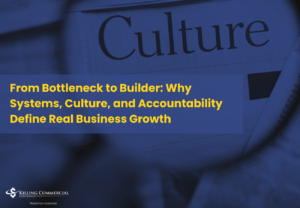Build a Best-in-Class Company Culture: Lessons from Erb & Young

Introduction
Company culture is a critical component of any successful business. It’s the invisible force that shapes your company’s environment, influencing how employees interact, their level of engagement, and ultimately, the overall success of the organization. A strong culture can attract top talent, reduce turnover, and enhance employee satisfaction. Erb & Young, an insurance agency from Orlando, FL, serves as a prime example of a best in class culture in the insurance industry. Their journey offers valuable insights into how intentional culture building can lead to extraordinary business outcomes.
The Foundation of Culture
Intentional Decision-Making
Building a strong company culture begins with a conscious decision from leadership. For Erb & Young, this was not just about creating a pleasant work environment but about defining who they were as an organization. The leaders at Erb & Young sat down and agreed that culture and personal development would be their top priorities. This intentional focus on culture from the very beginning set the stage for their future success. They understood that culture is not something that happens by chance; it requires deliberate effort and a clear vision.
Defining Culture
Culture is often mistaken for superficial elements like motivational quotes or workplace perks. However, as Erb & Young exemplifies, culture goes much deeper. It’s about identity and intentionality. Culture is the collective character of a business, shaped by the behaviors, beliefs, and values of its people. At Erb & Young, culture means being genuine, consistent, and intentional in everything they do. It’s not just how they behave but who they are, both inside and outside the office.

Building and Sustaining Culture
Creating a Competitive Advantage
At Erb & Young, culture is seen as a competitive advantage. They recognized early on that a collaborative approach was essential to achieving their goals. By fostering a strong, positive culture, they created an environment where employees felt motivated and engaged. This collaborative spirit not only made Erb & Young a great place to work but also contributed to their business success. A strong culture can drive performance, innovation, and growth, giving companies a significant edge over their competitors.
Characteristics of a Positive Culture
A positive culture is characterized by a strong sense of identity and belonging. At Erb & Young, the culture is built on genuine care for employees, creating an environment where people look forward to coming to work. This sense of belonging and mutual support is crucial for maintaining high levels of engagement and motivation. Employees at Erb & Young describe their workplace as one where their closest friends are their colleagues, highlighting the deep connections and strong relationships that define their culture.
Practical Steps to Building Culture
Genuine Care for Employees
One of the key aspects of Erb & Young’s culture is their genuine care for employees. This is evident in their approach to personal development. They invest in their employees’ growth, both professionally and personally. For example, they organize annual summits where the focus is not on insurance but on personal development, family, and life skills. This investment in people builds trust and loyalty, creating a strong bond between the company and its employees.

Hiring for Culture
Hiring the right people is crucial for maintaining and enhancing culture. Erb & Young’s hiring process is designed to ensure that new hires are a good cultural fit. They prioritize energy and enthusiasm over specific skills, believing that skills can be taught but cultural fit cannot. Their process includes multiple interview stages, involving different team members to get a well-rounded view of the candidate. They also emphasize the importance of third-party validation, where potential hires speak with current employees to hear about their experiences firsthand.
Tools and Strategies for Culture Building
Inspiration, Safety, and Connection
Erb & Young uses a framework of inspiration, safety, and connection to recruit, develop, and retain talent. They inspire their employees by providing a vision of a better tomorrow, making them believe in the company’s mission and their role in it. Creating a safe environment where employees can fail and learn without fear of retribution is another critical component. Finally, they emphasize connection and love, fostering deep relationships and a sense of belonging among employees.
Values and Decision-Making
Values are the foundation of culture. At Erb & Young, shared values guide decision-making and influence behaviors at every level of the organization. They have clearly defined values that serve as their North Star, ensuring consistency and alignment in their actions. This value-based approach helps build trust and fosters a cohesive culture where everyone is working towards the same goals.

Real-Life Examples and Testimonials
Employee Experiences
The personal stories of Erb & Young employees highlight the impact of a strong culture. For instance, one employee shared how their closest friends are their colleagues, underscoring the deep connections fostered within the company. Another employee spoke about the genuine care and support they received, both professionally and personally, which made them feel valued and motivated.
Success Stories
Erb & Young’s success stories demonstrate the tangible benefits of their strong culture. Despite starting with no money and no experience, they have grown their organization from scratch to over $6 million in revenue, with a trajectory that continues to rise. Their low turnover rate and high employee engagement are testaments to the effectiveness of their culture-building efforts.
Conclusion
Building a strong company culture is not just a nice-to-have; it’s essential for long-term success. Erb & Young’s journey shows that with intentional effort, genuine care, and a clear vision, any organization can create a best-in-class culture. By prioritizing culture, investing in personal development, and hiring for cultural fit, companies can create an environment where employees thrive and business flourishes. Reflect on your own company’s culture and consider implementing these strategies to take your organization to the next level.
Connect with Erb Young on LinkedIn:


From Bottleneck to Builder: Why Systems, Culture, and Accountability Define Real Business Growth
For most entrepreneurs, the decision to start a business is rooted in the promise of freedom. Freedom from a boss, freedom to control income, and freedom to build something meaningful. Yet for many business owners, particularly in service-based industries and middle-market companies, that freedom slowly erodes. What begins as ownership eventually turns into obligation, where the business demands constant attention and the owner becomes the single point of failure.

Why Standalone Cyber Insurance Beats BOP Extensions Every Time: Protecting Clients from Modern Threats
The insurance industry is full of shortcuts. Some producers look for ways to streamline the quoting process, others avoid hard conversations with clients, and many rely on endorsements or extensions because they are “easier” than diving into the details. Nowhere is this more dangerous than in the world of cyber insurance.
Too many agents assume that a cyber endorsement on a BOP or commercial package policy is “good enough.” It isn’t. In fact, treating a BOP cyber extension as a replacement for a standalone cyber policy leaves clients dangerously exposed, puts producers at risk of losing accounts, and opens the door to costly errors and omissions (E&O) claims.
Cyber threats evolve faster than any other area of risk, and endorsements simply can’t keep up. If producers want to protect their clients and themselves, it’s time to understand why standalone cyber insurance is non-negotiable.

Profiling, Preparation, and Persuasion: What Middle Market Insurance Producers Can Learn from Diamonds, Intelligence Work, and Executive Coaching
In the middle market, producers don’t lose because the competition has better pricing.
They lose because the competition understands people better—their motivations, their fears, their priorities, and what makes them say yes.

Cyber Insurance Risk Management: Why MFA, MDR, and BYOD Policies Can’t Wait for a Hard Market
The cyber insurance market has softened in recent years. Requirements that were once rigid — like mandatory multi-factor authentication (MFA) or endpoint detection and response (EDR) tools — have been relaxed by many carriers. But here’s the danger: just because carriers aren’t demanding these safeguards today doesn’t mean businesses can afford to ignore them.

AI, Authenticity, and the Future of Elite Production: What the Insurance Industry Must Learn from Craig Bender’s InsureU2 Revolution
The insurance industry is entering one of the most transformative seasons in its history. For decades, our world has been shaped by carriers, underwriting cycles, prospecting methods, and the grit of producers willing to outwork their competition. But today, a new force is reshaping the landscape—and most producers, agency leaders, and industry professionals aren’t ready for it.

From Imposter Syndrome to Intentional Growth: How Producers Win by Controlling Time, Trust, and the Submission Process
The commercial insurance world isn’t for the faint of heart. It’s unpredictable, chaotic, and constantly demanding producers to manage competing pressures—client needs, renewal deadlines, life events, prospecting goals, and agency responsibilities. And if you’re a middle-market producer, multiply that by ten.

Responses